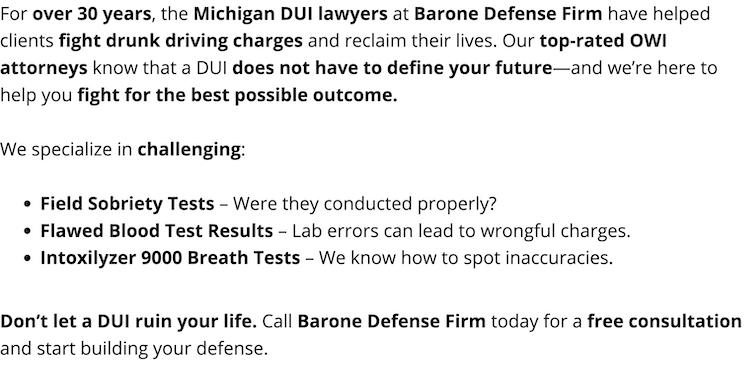BWI Lawyer
The Marine Safety section of Michigan's Environmental Protection Act makes it a crime to operate a boat while visibility impaired by alcohol and/or drugs. For this reason, it is very important to contact a Michigan DUI attorney. The consequences for boating while intoxicated (sometimes referred to as boating under the influence or BUI) are very similar to those for operating while intoxicated (OWI). The main difference is that a charge of boating while intoxicated will only affect your boating license—in other words; it will not impact your ability to drive a motor vehicle.
This law was changed considerably in 2014 as part of a longstanding effort to bring drunk boating into line with drunk driving. As part of these changes, the definition of a boat, or "vessel," was changed. Whereas previously the term, "vessel," was defined broadly enough to include any manner of watercraft capable of being used for transportation, and could therefore easily be extended to sailboats, canoes, paddle boats, or even inner tubes. The new law replaced the word, "vessel," with the word, "motorboat." Thus, while sailboats and canoes are no longer covered, jet skis are, although the definition of "personal watercraft" was replaced with a reference to the definition contained in the federal code.
The term, "operate," means to be in control of a vessel while it was under way. For purposes of the Act, one does not operate a boat while it was secured to a dock or at anchor. The legal blood alcohol content (BAC) limit for operating a motor vehicle intoxicated is .08 for drivers over 21. The 2014 law lowers the legal limit to .08, and makes it easier for prosecutors to show intoxication at any bodily alcohol level. This is because the new drunk boating law removed the presumptions contained in the old law. This means there is no longer a presumption that a person below .07 is presumed not be impaired. Gone, too, is the presumption that a person is presumed to be intoxicated above a .10.
Because there is no longer a presumption that a person is not impaired if below .07, a person can be convicted of intoxicated boating for alcohol levels well below the so-called legal limit. Consequently, if the prosecutor can show that a person's ability to operate a motor boat is significantly lessened at say a .05, that person can be found guilty of drunk boating.[i] The new law also added a "costs of prosecution" provision, which is similar to the motor vehicle laws.[ii]
Additionally, the new law is now in near-parity with that applicable to land-based motor vehicles relative to intoxication by drugs. Thus, one may be found to be guilty of drunk boating if he or she is under the influence of prescription drugs[iii] or has any amount of a schedule 1 drug[iv] in his or her system at the time of operation. The laws are only in "near parity" because it is still not unlawful to operate a motorboat while under the influence of an "intoxicating substance" such as a homeopathic drug.[v]
Also, a boating while visibly impaired charge is different than a boating while intoxicated charge—instead of showing that your BAC was over the legal limit, the prosecution only has to prove that your ability to operate the water craft was visibly impaired due to the consumption of alcohol.
Just as with motor vehicles, there are enhanced penalties for a second offense within seven years and a lifetime look back period for enhancing a third offense to a felony. There is now a zero-tolerance provision for boaters under the age of 21. The laws and penalties applicable to the intoxicated operation of a motor boat causing serious injury or death are largely unchanged.
A skilled Michigan defense lawyer can look at the claims of boating while intoxicated and/or visibility impaired to determine if the evidence is accurate. Because the "proof" is based on observations by law enforcement, a lawyer may be able to challenge these subjective claims.
Elements of BWI
The elements of a BWI charge are almost identical to those of an OWI or operating while intoxicated charge. They include:
- Operating a motorboat while your ability to safely do so is visibly impaired due to alcohol or controlled substance consumption
- Operating a motorboat while having a blood alcohol content (BAC) of .08 or more
- Operating a motorboat while having any amount of a Schedule 1 controlled substance in your system
Potential BWI Penalties
The penalties for first-offense BWI conviction closely resemble those associated with OWI. They include:
- A jail sentence of up to 93 days
- A fine of up to $500
- Up to 360 hours of community service
- Mandatory completion of an alcohol or drug education course
These penalties will increase for second and subsequent BWI convictions.
Felony BWI Charges
Causing a death while operating a boat under the influence of alcohol may result in a homicide charge. Michigan also classifies causing serious injury as a felony offense. If you are convicted of a felony homicide or serious injury charge, you could face prison time in addition to large fines. A third boating while intoxicated offense is also classified as a felony.
How an Attorney Can Help
The strategies used to fight a Michigan boating while visibly impaired offense are similar to those used for an operating while intoxicated charge. For this reason, you should fight your charges rather than plead guilty. The Michigan DUI attorneys at the Barone Defense Firm has experience with this type of law and will prepare a defense in order to reduce your chances of a conviction.
[i] Id.
[ii] MCL 324.80177(3), 324.80178(2), 324.80178a(3).
[iii] MCL 324.80171, MCL 324.80176(c).
[iv] MCL 324.80171.
[v] See MCL 257.625(25)(i).
 Barone Defense Firm Home
Barone Defense Firm Home
















